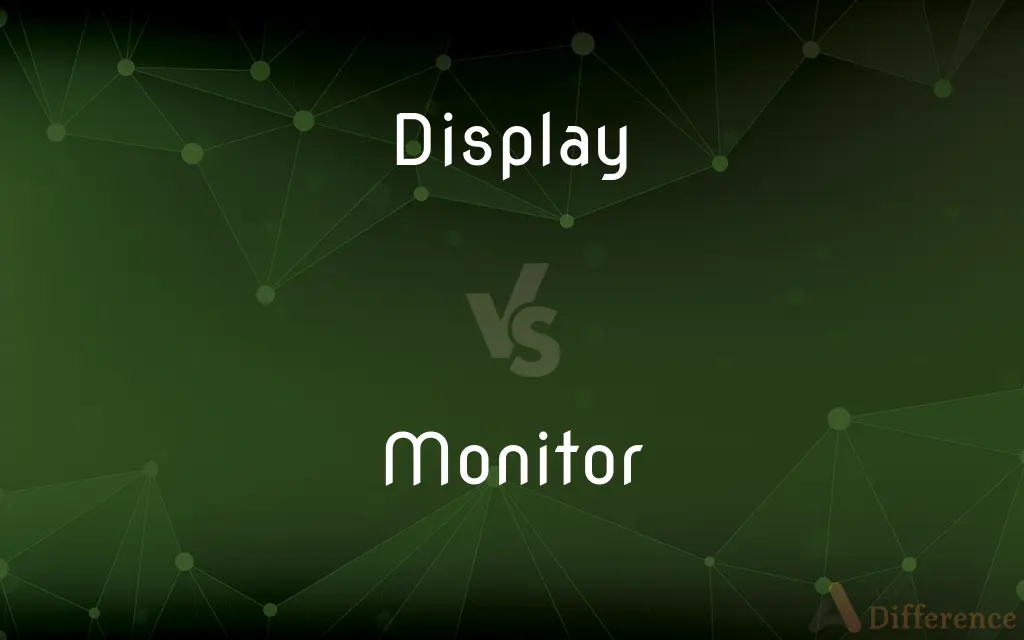Display vs. Monitor — What's the Difference?
By Fiza Rafique & Urooj Arif — Updated on March 31, 2024
A display is a general term for any output device that visually presents data, while a monitor specifically refers to a standalone output device that displays information from a computer.

Difference Between Display and Monitor
Table of Contents
ADVERTISEMENT
Key Differences
A display encompasses a wide range of devices capable of visually presenting information, images, or videos. This term is broad, including everything from digital billboards and smartphone screens to the screens used in digital watches and calculators. Displays use various technologies, such as LCD, LED, OLED, and more, to show content. On the other hand, a monitor is a specific type of display designed primarily for use with computers. It serves as the visual output device, showing data, graphics, and user interface elements from the computer.
Monitors are typically larger than many other types of displays and are built with features suited for desktop computing, such as higher resolution, input ports (like HDMI, DisplayPort), and ergonomic designs that can include adjustable stands.
While displays can be integrated into devices (like in smartphones, tablets, or laptops) or be part of a larger system (like in digital signage), monitors are usually separate peripherals that connect to a computer or a laptop, extending or mirroring the visual output. This distinction highlights the monitor's role as an independent device that enhances or enables the viewing of computer-generated content. Displays, due to their varied nature, can have a wide range of purposes and functionalities, adapting to different environments and needs, from portable devices to large-scale public screens.
The technological specifications of monitors are often more focused on enhancing the computing experience. They may offer features like high refresh rates, color accuracy, and resolutions that cater to professional, gaming, and general computing needs. Displays, given their broad categorization, might not prioritize these specific features but instead focus on aspects like power efficiency, visibility in various lighting conditions, or integrability within other devices.
Monitors typically come with more specialized functionalities compared to general displays. For instance, gaming monitors may have features like G-Sync or FreeSync to reduce screen tearing, and professional graphic design monitors might offer wide color gamuts and calibration options. Displays in other devices, while they may have features optimized for their specific use-case (like touch input on smartphones), generally do not focus on the high-performance metrics that monitors do.
ADVERTISEMENT
In terms of connectivity, monitors are equipped with ports that enable them to connect to a wide range of computing devices, supporting various input signals. This makes them versatile in terms of compatibility with different computer models and generations. Displays, especially those integrated into devices, may not require external connectivity to function, as they are designed to work within their specific device ecosystem.
Comparison Chart
Definition
A device for visually presenting data, images, or video
A specific type of display for computer output
Types
Includes digital billboards, smartphone screens, etc.
Primarily for desktop or laptop computers
Integration
Can be standalone or integrated into devices
Usually a standalone peripheral
Purpose
Broad, for general visual output
Specific, for enhancing computer use
Key Features
Varied, based on device or environment
High resolution, input ports, ergonomic designs
Technological Focus
Power efficiency, visibility, integrability
High refresh rates, color accuracy, gaming and professional features
Connectivity
May not require external connectivity
Equipped with ports for computer connection
Compare with Definitions
Display
Any device that visually presents information.
The smartphone's OLED display offers vibrant colors and deep blacks.
Monitor
A visual output device for computers.
His new 4K monitor provides stunning detail for graphic design work.
Display
Used across various devices and settings.
The digital billboard’s large display captures the attention of passersby.
Monitor
Offers specialized functionalities.
This monitor supports color calibration tools for professional photography editing.
Display
Can be integrated or standalone.
The car dashboard includes an integrated display showing navigation and system stats.
Monitor
Equipped for connectivity.
The monitor includes HDMI and DisplayPort inputs for easy connection to laptops and PCs.
Display
Focuses on broad visual output needs.
The smartwatch display is optimized for outdoor visibility and power efficiency.
Monitor
Typically a standalone peripheral.
The ergonomic stand of the monitor allows for adjustable viewing angles.
Display
Adapts to different technologies.
The e-reader’s e-ink display provides a paper-like reading experience.
Monitor
Focuses on computing needs.
The gaming monitor features a high refresh rate for smoother gameplay.
Display
To present to view; cause to be seen
The doctor displayed her diploma on the wall of her office. The autumn woods display a wide array of colors.
Monitor
One that admonishes, cautions, or reminds, especially with respect to matters of conduct.
Display
To exhibit ostentatiously; show off
Garish hosts who display their wealth whenever guests come over.
Monitor
A pupil who assists a teacher in routine duties.
Display
To show (images or information) on a screen
The time is displayed on the bottom right corner of the computer monitor.
Monitor
A usually electronic device used to record, regulate, or control a process or system.
Display
To be or give evidence of; manifest or reveal
Writing that displays broad knowledge.
A decision that displays poor judgment.
Monitor
A video display or speaker used in a production studio to check audio or video quality
The sound engineer detected a hiss on the monitor.
Display
To spread out; unfurl
The peacock displayed its fan.
Monitor
(Computers)A device that accepts video signals from a computer and displays information on a screen; a video display.
Display
(Biochemistry) To position (a protein, for example) on the surface of a biological entity such as a virus
Proteins displayed on a bacteriophage.
Monitor
(Computers)A program that observes, supervises, or controls the activities of other programs.
Display
(Zoology) To exhibit a behavioral display.
Monitor
An articulated device holding a rotating nozzle with which a jet of water is regulated, used in mining and firefighting.
Display
The act of displaying.
Monitor
A heavily ironclad warship of the 19th century with a low, flat deck and one or more gun turrets.
Display
Ostentatious exhibition
An attention-seeker who was fond of display.
Monitor
A modern warship designed for coastal bombardment.
Display
A public exhibition.
Monitor
See monitor lizard.
Display
Objects or merchandise set out for viewing by the public.
Monitor
To check the quality or content of (an electronic audio or visual signal) by means of a receiver.
Display
A demonstration or manifestation
A display of temper.
Monitor
To check by means of an electronic receiver for significant content, such as military, political, or illegal activity
Monitor a suspected criminal's phone conversations.
Display
(Zoology) A specialized pattern of behavior used to communicate visually, such as the presentation of colors or plumage by male birds as part of courtship or intimidation.
Monitor
To keep track of systematically with a view to collecting information
Monitor the bear population of a national park.
Monitored the political views of the people.
Display
An instance of such behavior.
Monitor
To test or sample, especially on a regular or ongoing basis
Monitored the city's drinking water for impurities.
Display
An advertisement or headline designed to catch the eye.
Monitor
To keep close watch over; supervise
Monitor an examination.
Display
An electronic device, such as a computer monitor or cellphone screen, that presents information in a visual form.
Monitor
To direct.
Display
(Biochemistry) An in vitro method by which genetically engineered proteins are placed on the surface of a biological entity (such as a bacteriophage, yeast, or ribosome) so that the properties of these proteins and those they bind to can be analyzed and manipulated for research purposes.
Monitor
To act as a monitor.
Display
A show or spectacle.
The trapeze artist put on an amazing acrobatic display.
Monitor
Someone who watches over something; a person in charge of something or someone.
The camp monitors look after the children during the night, when the teachers are asleep.
Display
A piece of work to be presented visually.
Pupils are expected to produce a wall display about a country of their choice.
Monitor
A device that detects and informs on the presence, quantity, etc., of something.
Display
A device, furniture or marketing-oriented bulk packaging for visual presentation for sales promotion.
Monitor
(computing) A device similar to a television set used as to give a graphical display of the output from a computer.
The information flashed up on the monitor.
Display
(computing) An electronic screen that shows graphics or text.
Monitor
A studio monitor or loudspeaker.
Display
(computing) The presentation of information for visual or tactile reception.
Monitor
(computing) A program for viewing and editing.
A machine code monitor
Display
(transitive) To show conspicuously; to exhibit; to demonstrate; to manifest.
Monitor
A student leader in a class.
Display
(intransitive) To make a display; to act as one making a show or demonstration.
Monitor
(nautical) One of a class of relatively small armored warships with only one or two turrets (but often carrying unusually large guns for a warship of its size), usually designed for shore bombardment or riverine warfare rather than open-ocean combat. from 1862
Display
(military) To extend the front of (a column), bringing it into line, deploy.
Monitor
(archaic) An ironclad.
Display
To make conspicuous by using large or prominent type.
Monitor
A monitor lizard.
Display
(obsolete) To discover; to descry.
Monitor
(obsolete) One who admonishes; one who warns of faults, informs of duty, or gives advice and instruction by way of reproof or caution.
Display
(obsolete) To spread out, to unfurl.
Monitor
(engineering) A tool holder, as for a lathe, shaped like a low turret, and capable of being revolved on a vertical pivot so as to bring the several tools successively into position.
Display
To unfold; to spread wide; to expand; to stretch out; to spread.
The northern wind his wings did broad display.
Monitor
A monitor nozzle.
Display
To extend the front of (a column), bringing it into line.
Monitor
(transitive) To watch over; to guard.
Display
To spread before the view; to show; to exhibit to the sight, or to the mind; to make manifest.
His statement . . . displays very clearly the actual condition of the army.
Monitor
One who admonishes; one who warns of faults, informs of duty, or gives advice and instruction by way of reproof or caution.
You need not be a monitor to the king.
Display
To make an exhibition of; to set in view conspicuously or ostentatiously; to exhibit for the sake of publicity; to parade.
Proudly displaying the insignia of their order.
Monitor
Hence, specifically, a pupil selected to look to the school in the absence of the instructor, to notice the absence or faults of the scholars, or to instruct a division or class.
Display
To make conspicuous by large or prominent type.
Monitor
Any large Old World lizard of the genus Varanus; esp., the Egyptian species (Varanus Niloticus), which is useful because it devours the eggs and young of the crocodile. It is sometimes five or six feet long.
Display
To discover; to descry.
And from his seat took pleasure to displayThe city so adorned with towers.
Monitor
An ironclad war vessel, very low in the water, and having one or more heavily-armored revolving turrets, carrying heavy guns.
Display
To output (results or data) in a visible manner on the screen of a monitor, CRT, or other device.
Monitor
A tool holder, as for a lathe, shaped like a low turret, and capable of being revolved on a vertical pivot so as to bring successively the several tools in holds into proper position for cutting.
Display
To make a display; to act as one making a show or demonstration.
Monitor
A monitor nozzle.
Display
An opening or unfolding; exhibition; manifestation.
Having witnessed displays of his power and grace.
Monitor
Display consisting of a device that takes signals from a computer and displays them on a CRT screen
Display
Ostentatious show; exhibition for effect; parade.
He died, as erring man should die,Without display, without parade.
Monitor
Someone who supervises (an examination)
Display
An electronic device on which the output signal of another electronic device may be presented in a visual form; - also called display device. Typically the display device it is the screen of a cathode-ray tube, as in a computer monitor, but other forms of visual display such as LED or liquid crystal devices are also used. The printed output from a computer or other device is not considered as a display.
Monitor
Someone who gives a warning so that a mistake can be avoided
Display
The output signal from a computer program, displayed on a display device. The displayed signal may consist of letters, numbers, or any graphical image.
Monitor
An iron-clad vessel built by Federal forces to do battle with the Merrimac
Display
A pattern of behavior, such as showing a body part to another animal, by which one animal conveys information to another, as for mating or defense.
Monitor
Electronic equipment that is used to check the quality or content of electronic transmissions
Display
Something intended to communicate a particular impression;
Made a display of strength
A show of impatience
A good show of looking interested
Monitor
A piece of electronic equipment that keeps track of the operation of a system continuously and warns of trouble
Display
Something shown to the public;
The museum had many exhibits of oriental art
Monitor
Any of various large tropical carnivorous lizards of Africa and Asia and Australia; fabled to warn of crocodiles
Display
An electronic device that represents information in visual form
Monitor
Keep tabs on; keep an eye on; keep under surveillance
Display
A visual representation of something
Display
Behavior that makes your feelings public;
A display of emotion
Display
Exhibiting openly in public view;
A display of courage
Display
To show, make visible or apparent;
The Metropolitan Museum is exhibiting Goya's works this month
Why don't you show your nice legs and wear shorter skirts?
National leaders will have to display the highest skills of statesmanship
Display
Make clear and visible;
The article revealed the policies of the government
Display
Attract attention by displaying some body part or posing; of animals
Common Curiosities
What is a display?
A display is a general term for any device capable of visually presenting data, images, or videos, used across various applications and devices.
What is a monitor?
A monitor is a specific type of display designed for use with computers, providing visual output with features suited for desktop computing.
Can a monitor be considered a display?
Yes, a monitor is a type of display specifically tailored for computer output.
How do monitors differ from other displays?
Monitors are designed specifically for computer use, featuring higher resolutions, input ports, and ergonomic designs, unlike general displays which have a broader range of applications.
What are some key features of monitors?
Key features include high resolution, high refresh rates, input ports like HDMI and DisplayPort, and ergonomic designs for adjustable viewing.
Can a TV be used as a monitor?
Yes, a TV can be used as a monitor if it has the appropriate input ports, though it may not offer the same performance features as a dedicated computer monitor.
Why are displays used in smartphones different from monitors?
Smartphone displays are designed for portability and power efficiency, focusing on touch input and visibility in different lighting conditions, unlike monitors which prioritize performance metrics like refresh rate and color accuracy for computing tasks.
What makes gaming monitors unique?
Gaming monitors offer features like high refresh rates, low response times, and technologies such as G-Sync or FreeSync to enhance gaming performance.
How important is resolution in a monitor?
Resolution is crucial in a monitor as it affects the clarity and detail of the visual output, important for tasks requiring precision like graphic design or enjoying high-definition media.
What considerations should be made when choosing a monitor?
Considerations include the monitor’s resolution, size, refresh rate, connectivity options, and whether it has features tailored to your specific needs, such as gaming or professional graphics work.
Are displays only used for visual output?
While the primary function of displays is visual output, some, like touchscreens, also accept input, making them interactive.
How do connectivity options differ between displays and monitors?
Monitors typically have a variety of input ports for connectivity with computers, while other displays may not require external connections or may use different types of connectivity suited to their specific device.
Share Your Discovery

Previous Comparison
Rite vs. Ceremony
Next Comparison
Deportation vs. RepatriationAuthor Spotlight
Written by
Fiza RafiqueFiza Rafique is a skilled content writer at AskDifference.com, where she meticulously refines and enhances written pieces. Drawing from her vast editorial expertise, Fiza ensures clarity, accuracy, and precision in every article. Passionate about language, she continually seeks to elevate the quality of content for readers worldwide.
Co-written by
Urooj ArifUrooj is a skilled content writer at Ask Difference, known for her exceptional ability to simplify complex topics into engaging and informative content. With a passion for research and a flair for clear, concise writing, she consistently delivers articles that resonate with our diverse audience.















































